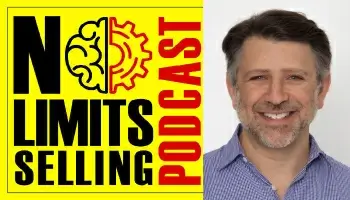Revolutionizing Sales with AI: An Insightful Conversation with Adam Honig, CEO of Spiro.ai
On Episode 229 of The No Limits Selling Podcast, we have Adam Honig, Chief Executive Officer at Spiro.ai. Adam is passionate about helping companies make more money using artificial intelligence, and is the driving force behind Spiro’s pioneering new approach: proactive relationship management. As CEO, he is focused on the company’s overall strategy and vision.
Previously, Adam co-founded a software company which he led through its successful IPO and sale. Afterwards, he founded Innoveer, one of the largest CRM consulting firms, which was successfully acquired by Cloud Sherpas (and then Accenture).

[EDITOR’S NOTE: This podcast is sponsored by No Limits Selling. It is a fun, fast-paced podcast that delivers hard-fought business advice that you can implement today to improve your sales and performance]
Interested In Our Real Estate Coaching Services? Explore Our Website: Link
Feeling Not Well Today? You Can Use Our Mindset Boosters App To amp Up Your Mood: Link
Find us on Social Media:
LinkedIn | Facebook community | Instagram
Like what do you listen to? Subscribe to our podcast!
Ready to become fearless? We can help you become fearless in 60 days so you accomplish more in your career Schedule A 15 min Call with Umar
Summary
Introduction and Background of Adam Honig
The podcast begins with Umar Hameed (UH) introducing Adam Honig (AH), the CEO of Spiro.ai. Adam shares his motivation behind starting Spiro.ai, expressing his frustration with the existing CRM systems. He wanted to create a tool that would help salespeople close more deals, leading to the birth of Spiro.ai.
The Role of Empathy in Sales
Adam emphasizes the importance of empathy in sales. He believes that the best salespeople are those who genuinely care about their customers and understand their needs. This understanding allows salespeople to provide solutions that truly meet the customer's needs, leading to more successful sales.
Artificial Intelligence in Sales
The conversation then shifts to the role of artificial intelligence (AI) in sales. Adam shares his belief that AI can help salespeople be more effective by focusing on the most important tasks and eliminating mundane tasks like data entry. He sees AI as a tool that can augment the abilities of salespeople, not replace them.
Challenges Faced by Salespeople
Adam and Umar discuss the challenges faced by salespeople. They talk about the pressure to meet sales targets and the difficulty of dealing with rejection. Adam believes that these challenges can be mitigated by having a positive mindset and a strong belief in the product or service being sold.
Advice for Salespeople
Towards the end of the podcast, Adam shares some advice for salespeople. He encourages them to always be learning and to not be afraid of failure. He believes that success in sales comes from a combination of hard work, skill, and a little bit of luck. He also emphasizes the importance of resilience and persistence in the face of challenges.
Conclusion
The podcast concludes with Adam expressing his optimism about the future of sales and the role of AI in shaping that future. He believes that AI will continue to evolve and become an even more valuable tool for salespeople in the future.
Questions & Answers
Who is Adam Honig?
What is the main takeaway from the podcast with Adam Honig?
What insights does Adam Honig provide for aspiring entrepreneurs?
What are some of the challenges Adam Honig faced in his entrepreneurial journey?
What was the motivation behind the creation of Spiro Technologies?
What is Spiro Technologies?
Don’t miss this opportunity to transform your real estate career with one-on-one coaching. As an experienced real estate coach, I, Umar Hameed, am dedicated to helping you unlock your full potential and achieve your real estate goals. To learn more about who am I and my clients ↓
If you’re ready to take the next step, book an appointment with me today and begin your journey toward success in the real estate industry.

